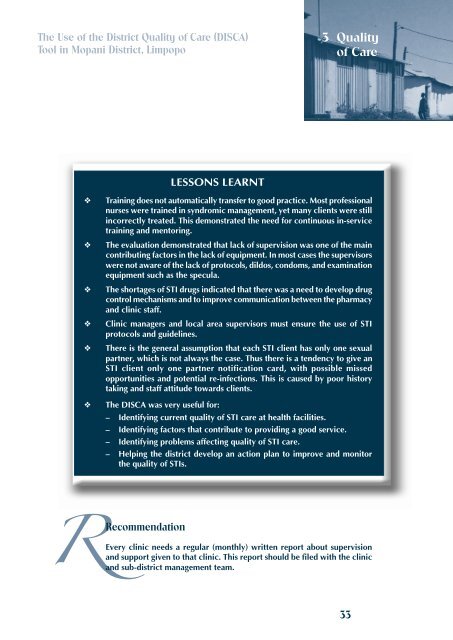Lesson learnt in the implementation of PHC - Health Systems Trust
Lesson learnt in the implementation of PHC - Health Systems Trust
Lesson learnt in the implementation of PHC - Health Systems Trust
You also want an ePaper? Increase the reach of your titles
YUMPU automatically turns print PDFs into web optimized ePapers that Google loves.
The Use <strong>of</strong> <strong>the</strong> District Quality <strong>of</strong> Care (DISCA)<br />
Tool <strong>in</strong> Mopani District, Limpopo<br />
3 Quality<br />
<strong>of</strong> Care<br />
LESSONS LEARNT<br />
❖<br />
❖<br />
❖<br />
❖<br />
❖<br />
❖<br />
Tra<strong>in</strong><strong>in</strong>g does not automatically transfer to good practice. Most pr<strong>of</strong>essional<br />
nurses were tra<strong>in</strong>ed <strong>in</strong> syndromic management, yet many clients were still<br />
<strong>in</strong>correctly treated. This demonstrated <strong>the</strong> need for cont<strong>in</strong>uous <strong>in</strong>-service<br />
tra<strong>in</strong><strong>in</strong>g and mentor<strong>in</strong>g.<br />
The evaluation demonstrated that lack <strong>of</strong> supervision was one <strong>of</strong> <strong>the</strong> ma<strong>in</strong><br />
contribut<strong>in</strong>g factors <strong>in</strong> <strong>the</strong> lack <strong>of</strong> equipment. In most cases <strong>the</strong> supervisors<br />
were not aware <strong>of</strong> <strong>the</strong> lack <strong>of</strong> protocols, dildos, condoms, and exam<strong>in</strong>ation<br />
equipment such as <strong>the</strong> specula.<br />
The shortages <strong>of</strong> STI drugs <strong>in</strong>dicated that <strong>the</strong>re was a need to develop drug<br />
control mechanisms and to improve communication between <strong>the</strong> pharmacy<br />
and cl<strong>in</strong>ic staff.<br />
Cl<strong>in</strong>ic managers and local area supervisors must ensure <strong>the</strong> use <strong>of</strong> STI<br />
protocols and guidel<strong>in</strong>es.<br />
There is <strong>the</strong> general assumption that each STI client has only one sexual<br />
partner, which is not always <strong>the</strong> case. Thus <strong>the</strong>re is a tendency to give an<br />
STI client only one partner notification card, with possible missed<br />
opportunities and potential re-<strong>in</strong>fections. This is caused by poor history<br />
tak<strong>in</strong>g and staff attitude towards clients.<br />
The DISCA was very useful for:<br />
– Identify<strong>in</strong>g current quality <strong>of</strong> STI care at health facilities.<br />
– Identify<strong>in</strong>g factors that contribute to provid<strong>in</strong>g a good service.<br />
– Identify<strong>in</strong>g problems affect<strong>in</strong>g quality <strong>of</strong> STI care.<br />
– Help<strong>in</strong>g <strong>the</strong> district develop an action plan to improve and monitor<br />
<strong>the</strong> quality <strong>of</strong> STIs.<br />
Recommendation<br />
Every cl<strong>in</strong>ic needs a regular (monthly) written report about supervision<br />
and support given to that cl<strong>in</strong>ic. This report should be filed with <strong>the</strong> cl<strong>in</strong>ic<br />
and sub-district management team.<br />
33

















